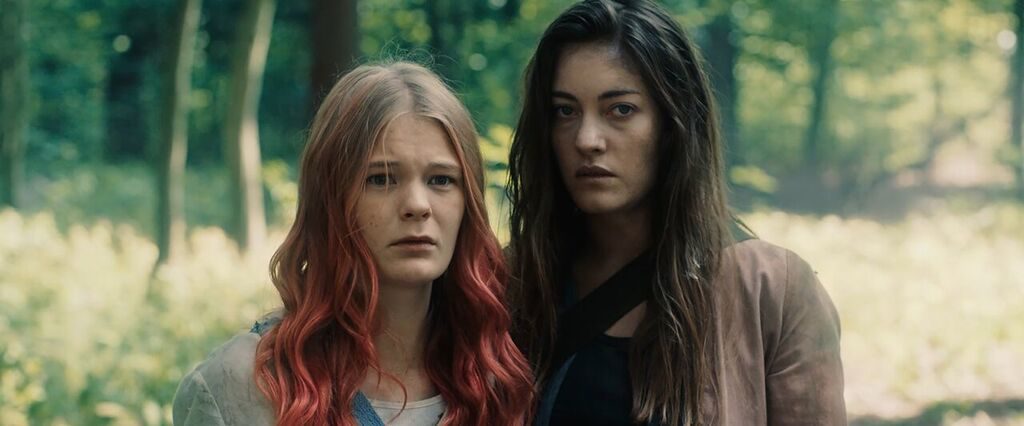Carolina Hellsgård is a writer-director born in Sweden and based in Berlin. Her critically acclaimed debut feature film “Wanja” premiered at the Berlinale in 2015 and was nominated for the Best First Feature Award.
“Ever After” (“Endzeit”) will begin screening at the 2018 Toronto International Film Festival on September 7.
W&H: Describe the film for us in your own words.
CH: “Ever After” is a film about two young women fighting their inner and outer demons. It is a horrific yet hopeful zombie film with a profound statement about our existence.
W&H: What drew you to this story?
CH: When I read Olivia Vieweg’s screenplay, I became fascinated by the subject of guilt. As a person, you often feel guilty about certain things. The film is about all of the bad stuff we did as well as the good things we did not do.
A horror movie is a great tool used to confront the characters with their own lives, force them to question their morals, and challenge their inner demons. How does one exist as a human being in this world? How do I treat other people? When I face chaos and difficulties, how do I react?
In horror films, inner demons are externalized and presented as something outwardly, as they are in “Ever After.” I am from Sweden, and I grew up with fairy tales speaking of trolls living in the forest. There is a direct link between my childhood bedtime stories and “Ever After.”
The story of “Ever After” is not only about guilt, but emancipation. Two young women leave an oppressive society and venture into an apocalyptic world. In the end, they decide to not return to civilization but to choose nature and ultimately freedom. They prefer chaos to order, freedom over control, and love over fascism.
In “Ever After,” Vivi and Eva embody the future and a new form of coexistence. Their symbiosis with nature is shown as an exciting possibility for humanity — not the end, but the beginning, as Vivi mentions in the film.
W&H: What do you want people to think about when they are leaving the theatre?
CH: I want people to think that we have to find new ways of coexisting in this world, both with each other and nature.
W&H: What was the biggest challenge in making the film?
CH: The biggest challenge was coordinating different art department components, such as elaborate zombie makeup, costumes, and set designs, in order to create a uniform look and style for the film. That required a lot of time and energy.
W&H: How did you get your film funded? Share some insights into how you got the film made.
CH: The production company Grown Up Films, with producers Claudia Schröter and Ingleore König, secured the German financing quite quickly. The financing was a mix of regional funds as well as TV — it included co-production funds like ZDF – Kleines Fernsehspiel and ARTE.
W&H: What inspired you to become a filmmaker?
CH: From childhood, I was interested in exploring memories as well as power dynamics and interdependencies in my own family. This remains relevant: my next feature film, “Sunburned,” is about a young girl and her position as an outsider in a family.
W&H: What’s the best and worst advice you’ve received?
CH: The best advice I ever received from one of my professors at CalArts was that casting is everything. If you find the right cast, directing will become much easier.
The worst advice came from my allegedly feminst professor at the Berlin Art Academy. She told me that women couldn’t be cinematographers because they are too physically weak. Back then, I was shooting my own films, so I was quite perplexed by what she said.
W&H: What advice do you have for other female directors?
CH: Work hard, but also try to enjoy life. Also, choose your collaborators wisely and trust them. Film is about giving up control to a certain degree.
W&H: Name your favorite woman-directed film and why.
CH: There are so many films, but I recently watched Lynne Ramsay’s “You Were Never Really Here” and I loved the eerie, hallucinogenic style of the film. I was very impressed by how Ramsay turns a hard-boiled thriller into an exhilarating, kaleidoscopic cinematic trip. She is a genius!
W&H: Hollywood and the global film industry are in the midst of undergoing a major transformation. What differences have you noticed since the #MeToo and #TimesUp movements launched?
CH: In Germany I think we have more of a general power problem. Some of the producers and decision-makers have a very authoritarian leadership style. Hopefully this will change.







